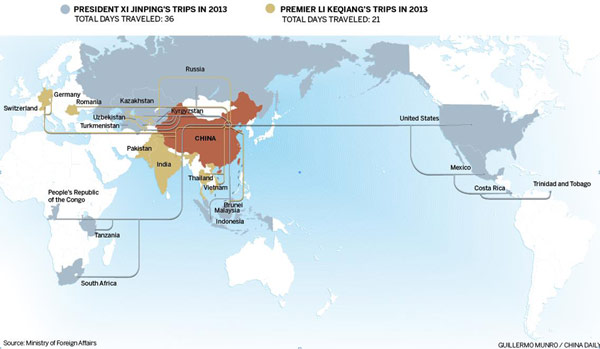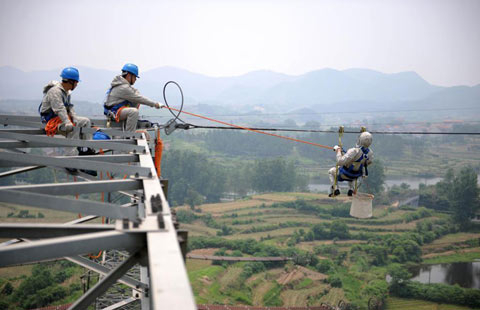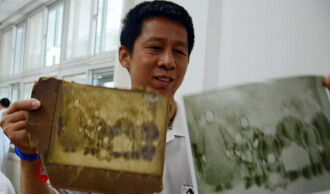Diplomacy to focus on neighborhood
By Li Xiaokun in Beijing, Fu Jing in Brussels, Zhang Chunyan in London and Chen Jia in San Francisco ( China Daily ) Updated: 2014-01-02 00:24:25

Japan and ASEAN nations
Duncan Freeman, senior research fellow of Brussels Institute of Contemporary China Studies, said Beijing should be "very careful" in its relations with its neighbors.
"It's not in China's interests to get neighbors nervous about the peaceful-rise strategy," said Steve Tsang, professor of Contemporary Chinese Studies at the University of Nottingham in England.
On Sino-Japanese ties, arguably the rockiest of China's diplomatic relationships, Jin from Renmin University said that in 2014, the two countries should ease their confrontation over the Diaoyu Islands, which hurts both sides.
Ian Taylor, professor of international relations at University of St Andrews in the UK, said, "What China, Japan and others should do is to make themselves heard without making others feel nervous. It's a difficult balance because making yourself heard can also be interpreted by others as being aggressive … particularly in that part of Asia. There are a lot of historical memories and tensions."
But Su Hao, a professor of Asia-Pacific studies at China Foreign Affairs University, said that Japan is committed to enhancing its ability to confront China in the "rivalry of peers".
He said China should strengthen legal enforcement and patrols in the East China Sea, including waters around the Diaoyu Islands and increase air forces in the region to "gradually win a strategic advantage".
"Tensions in the East China Sea are also a concern of the US. China should make concerted efforts with the US to contain the rising right-wing and militarist forces in Japan."
In Southeast Asia, Su said, Beijing wants to maintain stability, which was boosted in 2013 by China's breakthrough agreements with Brunei and Vietnam on joint development in disputed areas in the South China Sea.
Therefore, one priority will be implementation of the deals, he said.
Su said that Beijing also will seek "an upgrade in quality" in its economic relationship with ASEAN.
Foreign Minister Wang Yi said in December that China will seek early results in the building of the "maritime Silk Road" in 2014.
Beijing will also push for "tangible achievements" in upgrading the Sino-ASEAN free trade area and negotiations on the Regional Economic Comprehensive Partnership, he said.
"The will is important, the proposals are also eye-catching, but the key lies in implementation," Vice-Minister of Foreign Affairs Liu Zhenmin said when talking about China's 2014 diplomacy plan in Asia in an interview released on Wednesday.
Still, Su said, the Philippines will remain a spot of potential conflicts with China as Manila seeks international arbitration on the South China Sea instead of peacefully negotiating with Beijing.
DPRK and Afghanistan
Qu Xing, president of the China Institute of International Studies, said the "unstable and somehow unpredictable" situation in the DPRK might bring new turbulence and pose a challenge to China, which has all along tried to quench fires on the peninsula.
Beijing will also have to be alert for the potential security, political and economic impact of the withdrawal of troops of the US and NATO from Afghanistan and the presidential election in Afghanistan in 2014, he said.
The Chinese have increasing investments in their war-torn neighbor, which also plays a significant role in China's fight against terrorism, which is rampant in its western areas such as the Xinjiang Uygur autonomous region.
China will host an international foreign ministers' meeting on the Afghanistan issue in 2014.
Contact the writers at lixiaokun@chinadaily.com.cn.
Mo Jingxi in Beijing and Deng Yajun in London contributed to this story.
|
|
|
|
|
|
|
|


















 Op Rana
Op Rana Berlin Fang
Berlin Fang Zhu Yuan
Zhu Yuan Huang Xiangyang
Huang Xiangyang Chen Weihua
Chen Weihua Liu Shinan
Liu Shinan